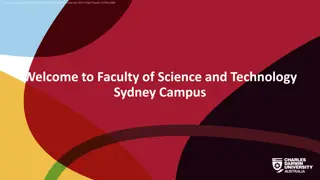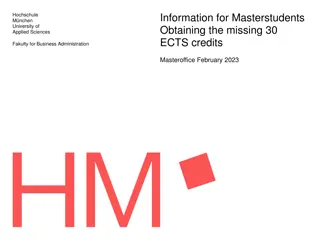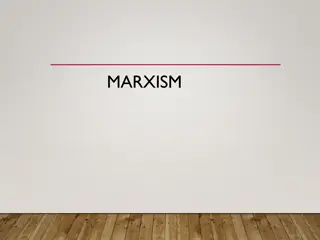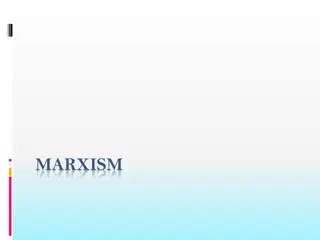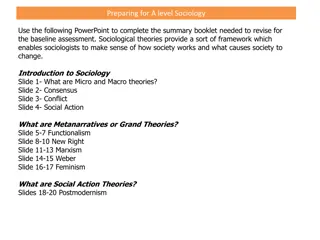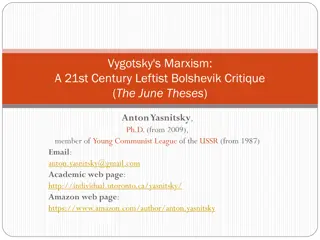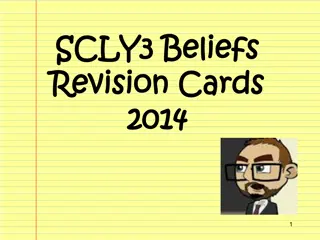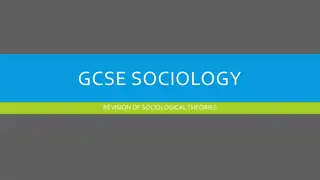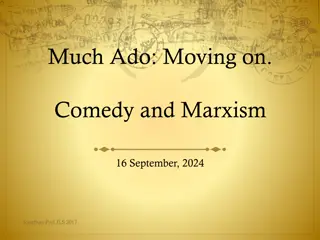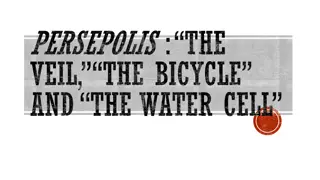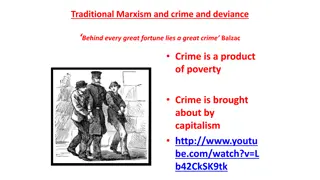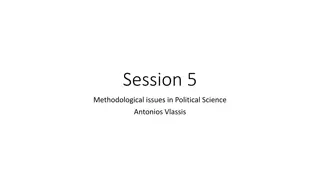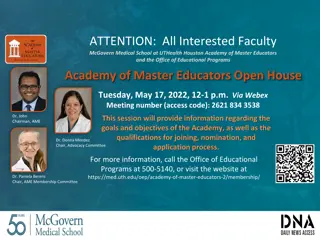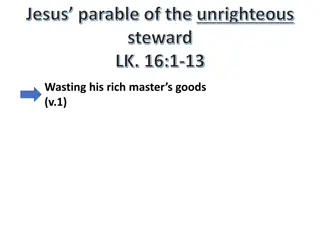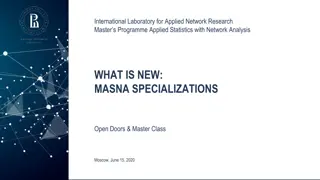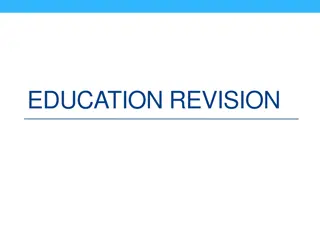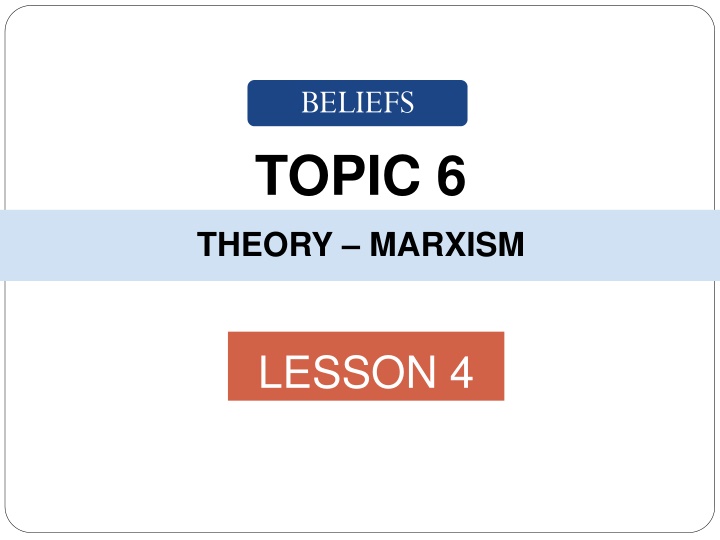
Marxist Perspectives on Religion and Class Conflict
Explore Karl Marx's views on religion, class inequalities, and how religion functions as the "opium of the people" in maintaining class conflict. Learn how religion is perceived through a Marxist lens and its role in societal divisions.
Download Presentation

Please find below an Image/Link to download the presentation.
The content on the website is provided AS IS for your information and personal use only. It may not be sold, licensed, or shared on other websites without obtaining consent from the author. If you encounter any issues during the download, it is possible that the publisher has removed the file from their server.
You are allowed to download the files provided on this website for personal or commercial use, subject to the condition that they are used lawfully. All files are the property of their respective owners.
The content on the website is provided AS IS for your information and personal use only. It may not be sold, licensed, or shared on other websites without obtaining consent from the author.
E N D
Presentation Transcript
BELIEFS TOPIC 6 THEORY MARXISM LESSON 4
Unit 3 Beliefs in Society Marxist Theories of Religion
What did Marx think of religion? The rich man in his castle; the poor man at his gate God made them, high and lowly; and ordered their estate Religion is the sign of the oppressed creature, the sentiment of a heartless world and the soul of soulless conditions. It is the opium of the people copy_1_439_marx_portrait - All Things Bright & Beautiful Cecil Alexander - Karl Marx Pairs: based on the above sources, write a sentence on why you think Marx believed:- 1. Religion legitimises class inequalities (makes them seem fair) 2. Maintains class inequalities & 3. Reproduces class inequalities. Give examples in your answers.
Religion: A Marxist Perspective For Marx, God did not create humanity but rather humanity created God Religion exists as a set of man made beliefs that HAVE EMERGED from the social and material conditions of our society e.g. Capitalism Religion isn t created by the ruling class nor does it exist to cause division/ conflict BUT KARL MARX 1818 1883 It operates primarily (unintended side effect) to preserve class conflict and has become an integral part of the way a ruling class divides and rules subordinate classes
How does religion maintain class conflict?
Imagine you have a toothache. You don t know what has caused it, but need to do something about it! You need relief and quick!!
You take a painkiller, the pain goes away and you feel much better But has the pain really gone away? All you have really done is taken a pill to block out the pain You ve cured the symptom but not the cause Once the painkiller wears off, the pain will return Marx applies the same reasoning to religion = social opium
Religion = The opium of the people What is opium? What are its effects? Opium for illegal use is generally converted into heroin, which doubles its potency. A key side effect is the suppression of pain. For Marx, religion becomes a sedative that the working class take and turn to to dull the pain of their oppression and alienation by their life of production under Capitalism It is both an expression of real suffering, and a protest against suffering . How? However, it does little to solve the problem it only distracts them from the real cause of their exploitation and provides an illusion of happiness. Why would this be a good thing for the ruling class?
Religion is seen by Marx as being ideological and promoting myths in 4 ways Legitimating social inequality How might religion perform these four functions? Disguising the true nature of exploitation Keeping the working class passive and resigned to their fate Religion as compensation
Marxist theories of religion Recap on Marxism Marxism sees society based on conflict, not consensus. Marxism sees society as divided in 2 classes, the powerful (bourgeoisie) and the powerless (proletariat). The powerful are able to control and exploit the powerless, through control of society s institutions, e.g. the media, the education system, RELIGION, etc. Institutions in society are used to help maintain ruling class power and perpetuate capitalism.
Marxist theories of religion Karl Marx Marx believed that rather than creating social order (functionalist view), religion was a tool used by the ruling class to help them control and exploit the working class. Religion is the opium of the masses. What do you think Marx meant by this statement? Marx believed that religion prevented the poor and the powerless from complaining or seeking to challenge society.
Marxist theories of religion How does religion control the proletariat? Religion justifies the social order it says that God determines people s status in society and is therefore unquestionable. e.g. from the hymn All Things Bright and Beautiful The rich man in his castle The poor man at his gate God made them high and lowly And ordered their estate. i.e. God made you rich or poor deal with it!
Marxist theories of religion The promise of an afterlife this prevents people from worrying about their situation whilst alive (e.g. poverty, alienation, exploitation etc.), because everyone will be happy in heaven. Making a virtue of suffering many religious stories suggest suffering is a good thing and will bring you closer to God. e.g. it is easier for a camel to pass through the eye of a needle than for a rich man to enter the kingdom of heaven. Matthew 10:25 Put the above biblical quotation into your own words Remember the flagellants? Flagellants in Italy
Marxist theories of religion Louis Althusser Althusser agreed with Marx that the function of religion was to help the ruling class maintain power. Althusser suggested that the ruling class had 2 means of control. The repressive state apparatus was the use of force e.g. the police and the courts. The ideological state apparatus was the use of ideology and the control of people beliefs E.g. through the education system, the media and RELIGION. This was far more effective. If you can make people agree with you, you don t need to force them to do what you want.
Neo Marxist theories of religion Neo Marxism takes a far more positive view of religion than traditional Marxism. Neo Marxism AGREES with traditional Marxism than there is inequality in society but argues that religion can help reduce inequality, rather than maintain it. This can occur when religion acts as a force for social change and challenges inequality for example LIBERATION THEOLOGY
Use these quotes to help you The first shall be last And the last shall be first Blessed are the meek For they shall inherit The Earth It is easier for a camel to pass through the eye of a needle than for a rich man to enter the Kingdom Of Heaven
LIBERATION THEOLOGY Liberation theology ( theology = a religious theory), refers to the power of religion to bring about social change, particularly in reducing inequality and freeing (liberating) the poor form the poverty. It is most often associated with the many Marxist Christian groups in South America.
Father Camilo Torres and liberation theology. Father Camilo Torres Restrepo (born in Colombia on 3 February 1929 died in Santander on 15 February 1966) was a Colombian socialist and Roman Catholic priest. During his life, he tried to bring together revolutionary Marxism and Catholicism. "If Jesus were alive today, He would be a guerrillero. (guerrillero = soldier/freedom fighter) "Revolution is not only permitted for Christians, but obligatory". Explain what you think Father Torres meant with these words.
What does Religion teach us about work? (Dominant Ideology) It is worth noting that, in Christian Teachings, Jesus had a day job: He worked as a carpenter. And we are led to believe that his disciples were Fisherman http://t3.gstatic.com/images?q=tbn:zYCPgdT04rp1TM:http://achristiancounselor.com/fishermen.jpg In Islamic teaching, the prophet Muhammad worked as a Shepherd http://t2.gstatic.com/images?q=tbn:2IImKiKqClnXWM:http://www.hf.uib.no/religion/popularikonografi/bilder/01b.jpg In the book of Exodus 34:12 in the Jewish Torah (Old Testament) God states that: Six days thou shalt work, but on the seventh day thou shalt rest: in earing time and in harvest thou shalt rest. The rich man at His castle, the poor man at His gate, God made them high & lowly and ordered their estate http://t1.gstatic.com/images?q=tbn:GpWRr7uKYqpTGM:http://www2.navarrocollege.edu/facultystaff/staff_pages/mrobinson/shared/images/choir01.gif
In the past it was accepted that Kings had Divine (God-Given) power and therefore could not be challenged or questioned. Catholicism teaches that the Pope s authority and power comes from Saint Peter the heir to Jesus ministry. In Catholicism the Pope is the highest authority. In ancient Eygyptian beliefs it was said that the Pharaoh Kings (the living embodiment of the God Horus) upon their death entered the heavens to become Osiris Once again their power was based upon divination. Question: > What sorts of messages (Ideology) might the W/C be receiving from these types of references? > How does religion justify class inequality?
http://t0.gstatic.com/images?q=tbn:nqPcR_8Jnzoj1M:http://www.fjaz.com/graphics/marx01.jpghttp://t0.gstatic.com/images?q=tbn:nqPcR_8Jnzoj1M:http://www.fjaz.com/graphics/marx01.jpg R/C Dominant Ideology essentially suggests that work is normal and that everybody has to work it is natural and part of life. Marx points out that passing on this Dominant Ideology to the W/C is only half the job complete. It is up to the R/C to make the W/C feel like they are the ones who ultimately benefit from working ..the R/C must also create FALSE CLASS CONSCIOUSNESS amongst the W/C http://www.happyworker.com/files/imagecache/poster_300/files/poster/be-a-happy-worker-m.jpg
According to Marx, Religion helps to create False Class Consciousness http://t3.gstatic.com/images?q=tbn:sbM_4kCve0m0tM:http://www.biografiasyvidas.com/monografia/marx/fotos/marx340a.jpg RELIGION is the OPIUM OF THE PEOPLE, a SPIRITUAL GIN that DULLS THE PAIN OF OPPRESSION. Religion eases the suffering of ALIENATION. 1) Religion acts as an eventual escape from suffering & oppression in this life with promises of a perfect life after death in heaven. http://t1.gstatic.com/images?q=tbn:NTnBsE_RndkngM:http://www.jesusdosanddonts.com/images/jesus01.jpg The Meek Shall Inherent the Earth 2) Religion offers hope of supernatural intervention to solve problems on earth. 3) Religion provides an explanation and justification for inequality e.g. The Hindu belief in resurrection justifies the unequal Caste System. http://t3.gstatic.com/images?q=tbn:SD9T0ASGp6O5yM:http://www.icgr.org/images/hinduism.gif
In Marxism then, Religion is an instrument of the R/C, used to justify class inequality and to control the W/C. Religion helps maintain the unequal class structure and as such keeps societies structure balanced (unevenly). Religion ensures that the W/C work, that they do not comparing about it and above all it prevents the W/C from rising up against the R/C Religion acts as a Conservative Force on Society Evaluation questions In what ways could Marxism be critiqued? How is Marxism similar/ different to the Functionalist Theory of Religion?
Compare and contrast functionalist and Marxist theories of religion Write an imaginary email or text conversation between Karl Marx and God (or the pope), discussing whether religion is a positive force for society. E.g. To: God36@heaven.com Hey G. whassup buddy? So religion huh? It s causing a bit of an issue here on earth How about we bin it? Thoughts? KM x
Evaluating the Marxist Approach to Religion What evidence can we use to both support and criticise the Marxist view on religion? How is neo- Marxism both similar and different to traditional Marxism? 1. 2.
Traditional Marxism Classical Marxism has a top down view of society It believes that religion, as part of the superstructure of society, is largely shaped by the infrastructure (the economy) We call this type of approach economic determinism
Marxism: Religion as a Conservative Force Functionalism claims that it does this through encouraging social solidarity and social stability Marxism however claims that it does this by legitimating social inequalities i.e. makes the position of the ruling and working class seem fair and so maintains the status quo It promotes MYTHS which = RULING CLASS IDEOLOGY Religion therefore, according to Marx, prevents class consciousness which would be necessary for a revolution
Conservative also means Traditional religion often defends traditional customs, beliefs Sometimes seeks to restore them when social changes have undermined or abolished them i.e. fundamentalism in Christianity, Islam, Judaism etc
STRENGTHS OF MARXISM Has several cases of supporting evidence Highlights the role that religion CAN play in legitimising inequality it has often supported the interests of the powerful and has provided comfort for the oppressed E.g. think about how the church supports crises in the Monarchy Princess Di s death Provided a useful balance for functionalist perspectives which take a one sided positive view of religion Provides a basis for neo- Marxism
CRITCISMS OF MARXISM Marxist s structural theory fails to account for freewill is our entire worldview really determined by economic needs? We still have class inequality BUT there is secularisation. Surely the ideological power of religion is undermined by the fact than 10% of people attend church? Marcuse (1964): believes secularisation is reducing the role of religion. Now commodity fetishism and a new God of consumerism and working class will again not realise their exploitation Marx said religion ALWAYS prevents change religion is sometimes used as the only means to oppose the ruling class. Recently in Britain, churches have provided safe havens for immigrant groups facing deportation by government
Welcome to the Dead Sociologists Show! Today, live in the Studio we have Karl Marx Emile Durkheim Father Camilo Torres


